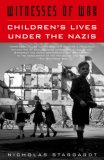Summary | Excerpt | Reviews | Beyond the Book | Readalikes | Genres & Themes | Author Bio

Critics' Opinion:
Readers' Opinion:
First Published:
Jan 2006, 512 pages
Paperback:
Jan 2007, 528 pages
 Book Reviewed by:
Book Reviewed by:
BookBrowse Review Team
Buy This Book
What Germans had feared in September 1938 came to pass in September
1939. As Hitler set out to address the Reichstag on 1 September,
formations of storm troopers lined both sides of his route from the
Reich Chancellery to the Kroll Opera House, but the crowds stayed away.
In other big cities it was the same: the streets remained empty and
deserted, as the period of painless and peaceful Führer miracles
abruptly ended. At work, at school and at home, Germans gathered around
the radio instead.
Images of the blood-letting and chronic shortages of the First World War
haunted national consciousness, and people of all walks of life, one
Social Democrat noted wryly in his secret report on public opinion,
"speak far more about provisioning than about politics. Each person is
entirely taken up with how to get his ration. How can I get something
extra?" After only a few weeks of rationing, the Sunday trains were full
of people leaving the towns to go "hamstering" for foodstuffs in the
countryside. Teenagers did not even bother to change out of their Hitler
Youth uniforms before going. Ditties started to circulate in Cologne
about the utter failure of the local Gauleiter, Josef Grohé, to set a
good example for modest living, while neighbours began to fear that
someone in their block of flats would denounce them to the police for
having succeeded in laying by soap, clothes or—best of all—shoes. People
who had lost their savings twice before feared wartime inflation and
rushed to turn their cash into anything that could be traded later on.
All unrationed luxury items, such as furs, swiftly sold out. By October
1939, the conviction was already growing that the country would not be
able to hold out as long as in the last war "because there's already
nothing left to eat." Only the soldiers, everyone agreed, had enough.
Grumbling and anxiety do not make a revolution, but the Gestapo was
taking no chances and had swiftly arrested all the former Reichstag
deputies from the Left. Yet socialists, who had hoped for the last six
years that war would bring down the Nazi dictatorship, had to admit in
late October 1939 that it would take a great deal more than a few
shortages: "Only if famine takes hold and has worn their nerves down,
and, above all, if the Western powers succeed in gaining successes in
the West and in occupying large portions of German territory, may the
time for a revolution begin to ripen." Not until early 1945 would such
conditions prevail, and by then much had happened to make a German
revolution an improbable outcome of this war. In this respect at least,
Hitler would have his wish: there would be "no second 1918."
For now, the government did all it could to reassure the population that
the war had made little change to life. While snaking lines of
London children, cardboard labels slung round their necks as they
clutched their small suitcases and gas masks, provided the media with
its first vivid images of the British war, in Germany there was no mass
evacuation of children from the cities. Hermann Göring was so confident
in the power of the Luftwaffe he had built up, he joked that if a single
German city was bombed, then people could call him "Meier." Still
hopeful of negotiating a peace settlement with Britain, Hitler
explicitly reserved to himself any decision to commence what he called
the "terror bombing" of its civilian population.
Excerpted from Witnesses of War by Nicholas Stargardt Copyright © 2006 by Nicholas Stargardt. Excerpted by permission of Knopf, a division of Random House, Inc. All rights reserved. No part of this excerpt may be reproduced or reprinted without permission in writing from the publisher.





The Funeral Cryer by Wenyan Lu
Debut novelist Wenyan Lu brings us this witty yet profound story about one woman's midlife reawakening in contemporary rural China.
Your guide toexceptional books
BookBrowse seeks out and recommends the best in contemporary fiction and nonfiction—books that not only engage and entertain but also deepen our understanding of ourselves and the world around us.